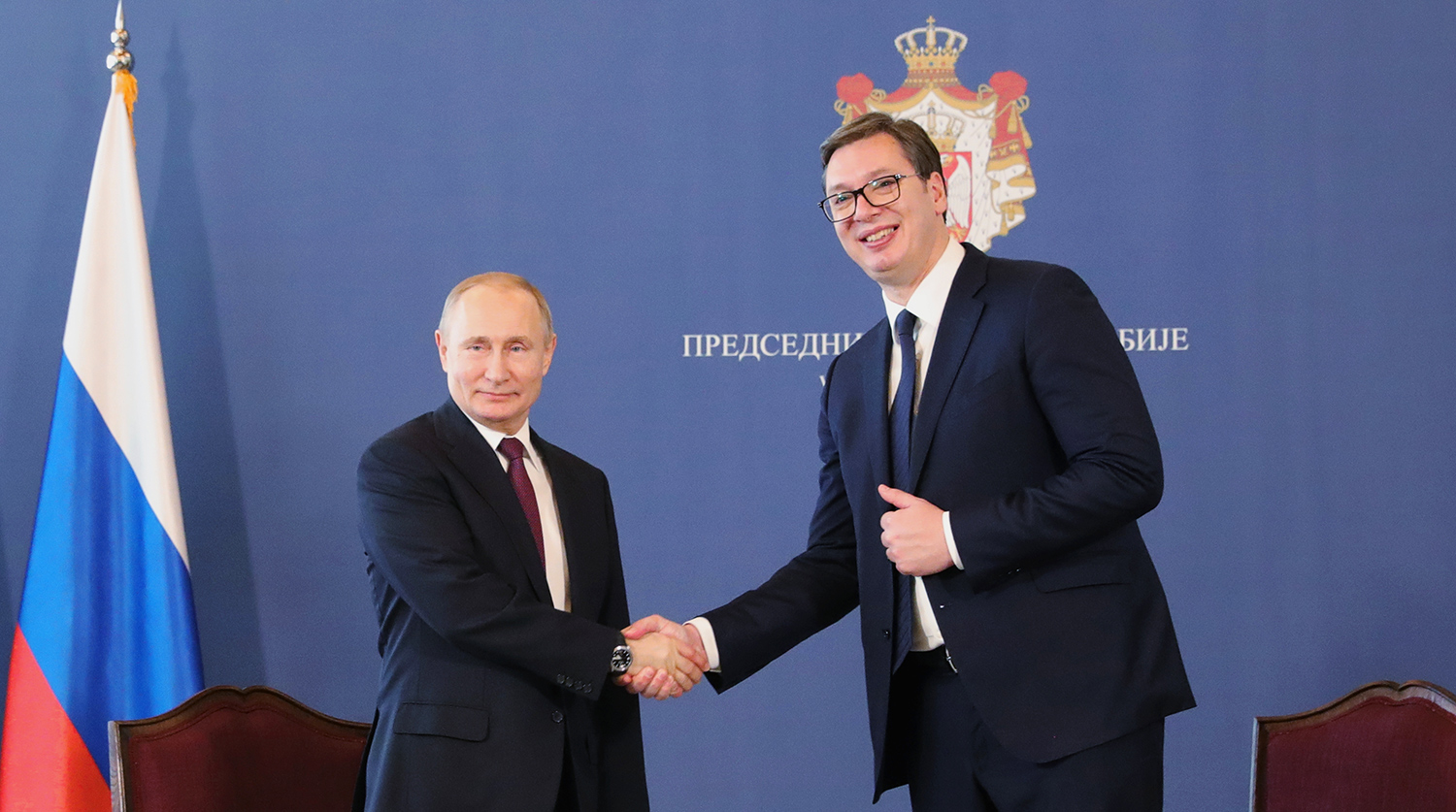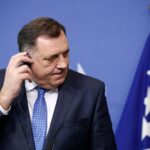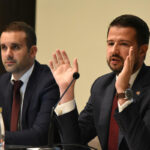Protests by the opposition and civil society activists against election fraud organized, as they believe, by the authorities, should remain part of Serbia’s domestic political life, a component of the domestic political debate, and a factor in the country’s required transformation on its European integration path. Nothing revolutionary here…
The main goal declared by protest participants was a fair and honest election without manipulation and vote stealing, which is just a reiteration of demands that are already a must for a country that is already working to join the European Union. The protests that unfolded after the voting day on December 17 were limited to the capital and focused on specific violations (related, first of all, to the mass “import” of voters from Republika Srpska, that is, from neighboring Bosnia and Herzegovina to Belgrade) and did not call for a violent toppling of the current government.
The incidents that took place on December 24 outside the Skupština walls in Belgrade, where demonstrators clashed with law enforcement after one group tried to break into the building, did not change the general trend of protests. The opposition immediately distanced itself from those who shattered the windows in the Belgrade City Hall, and even claimed those were government-hired provocateurs. The radicalization of protests saw no support on the part of opposition leaders, civil society activists, and Western diplomats.
Still, the Serbian authorities saw both the local incident and the protests in general as a manifestation of a conspiracy to overthrow the government / destabilize Serbia, that was “backed” by foreign (Western) centers of influence.
Milos Vucevic, head of the ruling Serbian Progressive Party, deputy prime minister and defense minister, in his New Year’s interview on pro-government’s Pink.rs TV channel, said: “It would be naive to suggest these are spontaneous protests that have nothing to do with any foreign agency. The violent speeches from the opposition are directed against the state, not against the authorities. … We know how to preserve peace and stability, we know how to preserve the country, and we will do it.”
So that there are no illusions as to which “foreign agencies” the Serbian government official referred to, it should be recalled that Serbian President Aleksandar Vučić and Serbian Prime Minister Ana Brnabić talked about the influence of Western intelligence on the Belgrade protests.
After the incidents outside the Skupština in Belgrade, the head of the Serbian government said: “I especially feel tonight that it is important to stand up for Serbia and thank the Russian security services who had this information and shared it with us.”
The day after the clashes by the capital City Hall, the President of Serbia eloquently met with the Russian Ambassador, Aleksandr Botsan-Kharchenko. After the meeting, Vučić said that he had informed the Russian diplomat about the riots in the capital and stressed that the authorities would do everything to protect the safety of Serbian citizens.
In turn, Botsan-Kharchenko stated that the Serbian president claimed the West had stood behind the riots in the Serbian capital. “Understanding that even in Belgrade, the plans were not implemented in a calm, peaceful way, the opposition immediately launched protests, which are encouraged and supported from outside. … It is the case, and Vučić spoke about it. I will not and cannot resort to details because this is a confidential conversation and confidential information, but he has indisputable data that there is incitement and support coming from the West,” the diplomat told Russian media.
There were no refutations of the statement from Serbian authorities.
It should be noted that Serbian society was already prepared for exactly this positioning of the protest movement. The narrative that any civil activism opposing the current government is a “manifestation of the West’s conspiracy against Serbia” had been promoted in the Serbian public space well in advance, even before the elections.
In May 2023, protests swept across Serbia under the slogan “Serbia against violence” – following two mass shootings where children and teenagers were killed in Belgrade and some villages around the capital. The movement later transformed into a political bloc that took part in the elections and came runners-up after the ruling party. But even more than six months prior to the elections, in May 2023, Aleksandar Vučić stated that it was not about a civil protest against the government’s policy, which did not prevent mass shootings, but about the preparation of a “color revolution”, that is, a plot to violently overthrow the government – because this is how Belgrade (and Moscow) interprets this term. At the forum of the Serbian Progressive Party, the president then announced that he had received a tip about this from a “close” intelligence agency services “from the East.” “I receive information from various agencies. Agencies close to us from the East say that these are attempts at launching color revolutions,” he said.
For everyone who follows the developments at the top echelons of the Serbian government, it is clear through which channels this signal reached the head of state. After all, Aleksandar Vulin, then director of the Serbian Security Information Agency, BIA, ex-Minister of Defense and ex-Minister of Internal Affairs, never hid his close ties with his Russian counterparts.
This is how the Russian outlet Kommersant writes about him: “Alexander Vulin is sharply anti-Western and strongly pro-Russian. In recent years, he has visited Russia more than once, where he certainly met with the Secretary of the Security Council, Nikolai Patrushev.”
As an example of their cooperation, in 2021, the Security and Information Agency of Serbia wiretapped Russian opposition figures in Belgrade who set up a seminar for Russian municipal deputies in Belgrade, after which Vulin, the then head of the Ministry of Internal Affairs, came to Moscow to hand over the tapes to Patrushev. A few months later, colleagues from the security agencies met once again in the Russian capital to emphasize the importance of cooperation between Russia and Serbia to counter “color revolutions.” According to Serbian media, a joint Russian-Serbian working group was set up to prevent mass demonstrations and monitor opposition activists, non-governmental organizations, and independent journalists “in top secrecy”. The Russian side allegedly undertook to transfer to the Serbian side “all knowledge” on fighting online resistance and street protests.
In May 2023, at the outset of the Serbia against Violence protest action, Vulin once again flew to Moscow. The official reason for the trip was his participation in the International Security Conference held in the capital of Russia.
In July of the same year, the head of the BIA was designated by the U.S. Government for the involvement in transnational organized crime, illegal operations related to drugs, and abuse of official position. In addition, it was alleged that through abuse of office, he provided Russia with a platform for malign actions to increase its influence in the region.
In November, a month and a half prior to the elections, Vulin resigned. Commenting on his move, he issued a massive political manifesto, which, in particular, included the following words: “The USA and the EU want my head…”
After Vulin’s sacking, there were no radical reforms or personnel reshuffles in the BIA, the current acting director represents the old team, therefore the agency likely continues to operate by the established practices and with traditional partners, so it provided the state leadership with a report on “an attempt by the West to organize a color revolution.”
In addition to intelligence cooperation, the Russian propaganda network operating in Serbia became an important component of the hybrid special operation aimed at promoting the idea of a conspiracy between the West and the opposition to overthrow the government.
Here is just one example.
In early November, on the eve of the December parliamentary and local elections, the civil initiative ProGlas was founded by Serbian non-partisan intellectuals and public figures – scholars, teachers, lawyers, and actors… The association called for changes in Serbian politics, claiming that that the government led by Aleksandar Vučić and the Serbian Progressive Party must change so that Serbia becomes a different country. ProGlas did not campaign for any opposition electoral bloc, acting as a non-partisan movement for democratic change through fair elections.
The petition, published on the initiative’s website, was signed by more than 190,951 citizens on election day, December 17, 2023 (with a total number of voters being over 6,500,000).
In early December, the Serbian office of the Russian propaganda agency, RT Balkan, published an “investigation” into “alleged links” between ProGlas and the West. “Investigators” linked the initiative first to the “House of Human Rights and Democracy” in Belgrade, then to civil society organizations working at that address, then to Western donors of these organizations, and then speculated on who might stand behind these donors. It was “found” that these are various Western governments, the European Commission, Soros, and the CIA.
RT’s “investigation”, published on December 6, 11 days before ballot day, was widely circulated by Serbian media in the following days, including by tabloids such as Informer, as well as the supposedly respectable B92 and Politika, which positions itself as the “oldest and the most influential daily newspaper in this part of Europe.”
It is obvious that all the post-election statements made by the president, prime minister, and defense minister about the alleged Western influence on the opposition protests in Belgrade were broadcast to an audience that had been “prepared” to hear that message. The Serbian leadership did not even have to explain who exactly “organized” the rallies. It was enough to mention some foreign influence and for the citizens who watch / listen to / read Vučić’s speeches and the Russian or local pro-government media, everything was already “clear”. After the latest statements by the heads of the state and government, the Serbs simply saw a formal confirmation of their conspiracy suspicions.
It is obvious that the current Serbian government articulates quite clearly that Belgrade stands by Moscow’s side and relies on Kremlin’s support. It is evident that Washington and Brussels are trying to ignore this, probably still hoping that cooperation with Vučić’s team for the sake of Serbia’s European future remains on the table. But it is also obvious that thanks to the Russian hybrid influence, which no one in Belgrade can or is willing to effectively counter, as well as thanks to the conscious pro-Kremlin stance of the Serbian government, the level of anti-Western sentiment in Serbia will only be growing. However, the irony is that no one can be sure that at some stage of Serbia’s drift towards Moscow, the Serbs, infected by Russian propaganda won’t label Vučić himself a “Western agent”.



